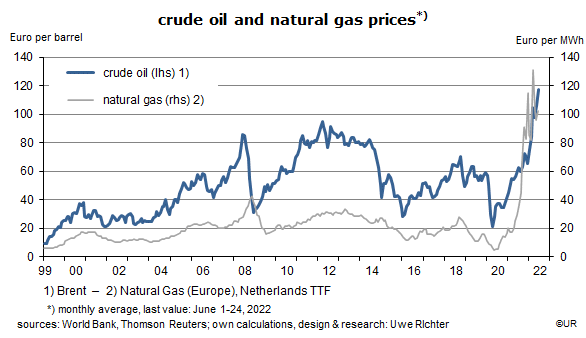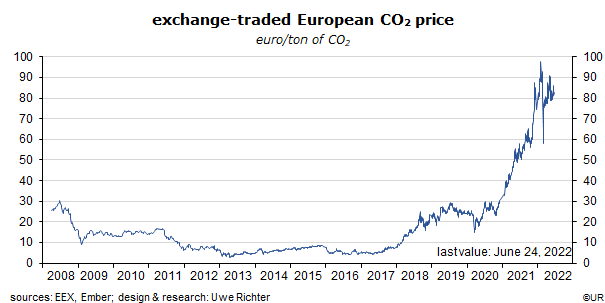
Market Commentary: Putin helps to improve Europe’s climate
Dieter Wermuth, Economist and Partner at Wermuth Asset Management
It is extremely unlikely that the rapid increase of fossil fuel prices, triggered by Russia’s invasion of Ukraine, won’t lead to a significant reduction of European demand for coal, gasoline, heating oil and gas and thus to a similarly large reduction of CO2 emissions. In a way, Wladimir Putin does the job for EU climate activists and thus takes the blame for the explosion of energy prices. But those higher prices are actually exactly what the doctor would have prescribed. If you want to do something good for the climate, you have to increase the price of fossil fuels and thus of CO2 emissions. This is the consensus among economists. Voilá! Thank you, Mr Putin.

Since its last low in April 2020, the price of crude oil, expressed in euros, has gone up by 445%. For comparison, the German price for premium gasoline has increased by about 40%, and the price for households’ retail price of natural gas by something in the order of 300%. In combination with the inflation of other fossil fuel and electricity prices, the disposable annual income for other purposes has shrunk by about 110 billion euros, or 4.5%. In the euro area things were comparable but of course on a bigger scale, perhaps by factors of 3 to 4.
Ex-energy, the disposable income of business and households is thus much smaller than before. This has increased the risk of another recession. In an article for “Wirtschaftsdienst” (2022/13), Sebastian Dullien and Ulrike Stein show that new German and EU climate targets require very high prices for all fossil fuels. The lower chamber of Germany’s parliament (the Bundestag) has recently voted to reduce the target for the emission of greenhouse gases by 65% in 2030, compared to 1990, and to achieve climate neutrality by 2045. Other EU countries have similar, if less ambitious targets.
According to Dullien and Stein, if Germany’s climate policy would fully rely on the effects of higher CO2 prices, these would have to rise to 200 euros per ton to reach the new emissions targets – or to even higher levels, depending on the other assumptions in the simulation models. At the European exchange for emission rights, the price is presently just 82 euros per ton. While this is about thirteen times more than in 2017 – when the price began to take off -, it remains much too low. At a price of 200 euros per ton of CO2, heating oil per liter would become 0.60 euros, premium gasoline 56 eurocents more expensive (in comparison to January 2022). These are large numbers.

In the wake of Russia’s invasion of Ukraine, prices of fossil fuels and emission rights have moved in the right direction, seen from a climate policy point of view. It is important to prevent prices falling back to their pre-crisis levels once the war ends. Experienced European politicians have learned that no good political crisis should go by unused. The European project has always been driven by responses to crises. In case of peace or a durable ceasefire, the number of emission rights distributed and auctioned off should therefore quickly be reduced significantly to stabilize their prices at a high level. Alternatively, taxes and fees on coal, oil, gas and electricity can, or must be raised to achieve the same effect. For the sake of the climate, the demand for CO2-intensive energy should not be allowed to rise again.
Such measures generate revenues for the state. At present, Europeans are transferring a large part of their income to energy producers in Russia and Arabia, among others, in the form of steeply increased import prices. Since expensive energy has a significant regressive effect on a country’s income distribution – poor households are hit relatively harder than richer ones -, the state can use its additional income from CO2-related charges to adopt policies which correct those social imbalances. The success of climate policies depends crucially on their perceived fairness. CO2-revenues can also be used to finance part of the ongoing green structural change.
Energy prices must not be allowed to fall again – not before the transition to an emissions-free economy has been achieved.
###
For more information please contact:
Instinctif Partners
Lars Hofer
E lars.hofer@instinctif.com
T +49 162 562 8917
Visit us: https://wermutham.com/
Follow us on Twitter and LinkedIn
About Wermuth Asset Management
Wermuth Asset Management (WAM) is a Family Office which also acts as a BAFIN-regulated investment consultant.
The company specializes in climate impact investments across all asset classes, with a focus on EU “exponential organizations” as defined by Singularity University, i.e., companies which solve a major problem of humanity profitably and can grow exponentially. Through private equity, listed assets, infrastructure and real assets, the company invests through its own funds and third-party funds. WAM adheres to the UN Principles of Responsible Investing (UNPRI) and UN Compact and is a member of the Institutional Investor Group on Climate Change (IIGCC), the Global Impact Investing Network (GIIN) and the Divest-Invest Movement.
Jochen Wermuth founded WAM in 1999. He is a German climate impact investor who served on the steering committee of “Europeans for Divest Invest”. As of June 2017, he was also a member of the investment strategy committee for the EUR 24 billion German Sovereign Wealth Fund (KENFO).
Legal Disclaimer
The information contained in this document is for informational purposes only and does not constitute investment advice. The opinions and valuations contained in this document are subject to change and reflect the viewpoint of Wermuth Asset Management in the current economic environment. No liability is assumed for the accuracy and completeness of the information. Past performance is not a reliable indication of current or future developments. The financial instruments mentioned are for illustrative purposes only and should not be construed as a direct offer or investment recommendation or advice. The securities listed have been selected from the universe of securities covered by the portfolio managers to assist the reader in better understanding the issues presented and do not necessarily form part of any portfolio or constitute recommendations by the portfolio managers. There is no guarantee that forecasts will occur.
Read the full article in PDF format here: English.